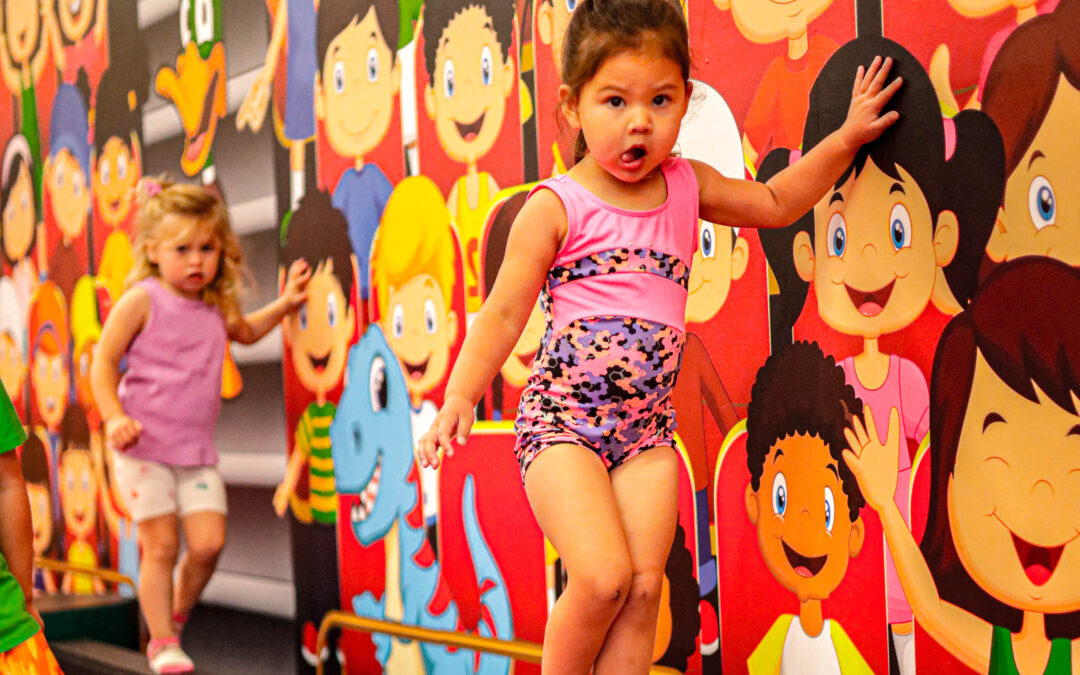Collaborative play is a type of play that children and toddlers engage in that involves taking turns with others, sharing, following rules, socializing, and negotiating. Teamwork and socialization skills are critical abilities in all periods of life- and the capacity to do so starts in early childhood and toddlerhood. In most instances, children early in life engage in something called parallel play, meaning that they spend most of their time playing near each other, not with each other. On the other hand, something called competitive play involves clear winners and losers, while every child involved in collaborative play wins.
Play is a critical part of a child’s development, as it teaches them many skills that further their abilities in all areas- including but not limited to emotional, social, physical and cognitive. The type of play that a child engages in is directly related to where they play and what type of environment it produces. Here at S.W.A.G. Kid’s Gym, collaborative play is our main focus. The main aspects of collaborative play that are on display here at our gym include sharing, taking turns, listening to rules, teamwork, and socialization. Collaborative play is one of the six stages of play that is recognized by the American Sociological Association. This stage of play involves children working together towards a common purpose or goal, the goal here- having fun! The benefits of collaborative play include cooperation as a skill, communication skills, building the concept of trust, helping to resolve conflicts, improving vocabulary and listening skills, and improving confidence and self-esteem.
In our Lightning Bolts class, which is available for children ages 2-4, we capitalize on a free play environment that also includes a structure to keep children engaged and having fun. Children in this class participate in obstacle courses, time on our air track, ball time, and bubble time to end class. The different aspects of collaborative play are on display in each of the activities.
Sharing
Sharing is something that is vital to a child’s development and shaping them into a sociable child that can progress into other activities as they grow older, enabling them to be able to work with others and form relationships. Especially in the segment of class where they can play with the balls and the basketball hoop, sharing the different toys with other children will help them to
build empathy and help others. Demonstrating sharing to a child shows them that giving to others and making sure other children have a turn will help everyone have more fun, and will build a great habit as they develop.
Taking turns
Another important skill that your child will benefit from in collaborative play is taking turns. When the children in the Lightning Bolts class participate in obstacle courses, they will learn how to wait their turn in line and how to let other children get their chance to participate. Taking turns in toddlerhood builds a great deal of impulse control and helps toddlers to understand that if they wait patiently, they will get their own turn very soon.
Obeying rules
Obeying rules is something that children and toddlers are faced with all of the time and is a skill that is essential. One of the best ways to teach children how to follow rules is to let them have freedom to make their own choices while also providing them with a structure and a set of rules that need to be followed. While simultaneously having rules and freedom, the child quickly learns that they will have the most fun and the most opportunities to play if the rules set in place are followed.
Teamwork
One of the most important skills a child can learn is teamwork and how to get along with their peers. In our classes we encourage collaboration over competition. An example of teamwork in our Lightning Bolts class is after ball time when the children must all work together to clean up the balls. They understand that the sooner they clean up and work together, the sooner the class can move on to the next activity and have the most fun.
Negotiating
Negotiating is a skill that children use a lot more than some may recognize and is very important to their development and how they will solve problems in the future. One example of this in our class would be if a child wants the red soccer ball, but it is being used by another child. They could use their communication skills to ask them for the ball or could negotiate with them by giving them the blue soccer ball in exchange for the one that they want.
Play is something that all children engage in and is a vital part to development, as it is how the child learns. Here at S.W.A.G., we are all about play. In the numerous stages of play that your child will engage in over their childhood, collaborative play has the potential to give them the most skills and abilities that they otherwise would not have. In a safe play environment, collaboration shines and leads to years of great teamwork, communication, and development.
